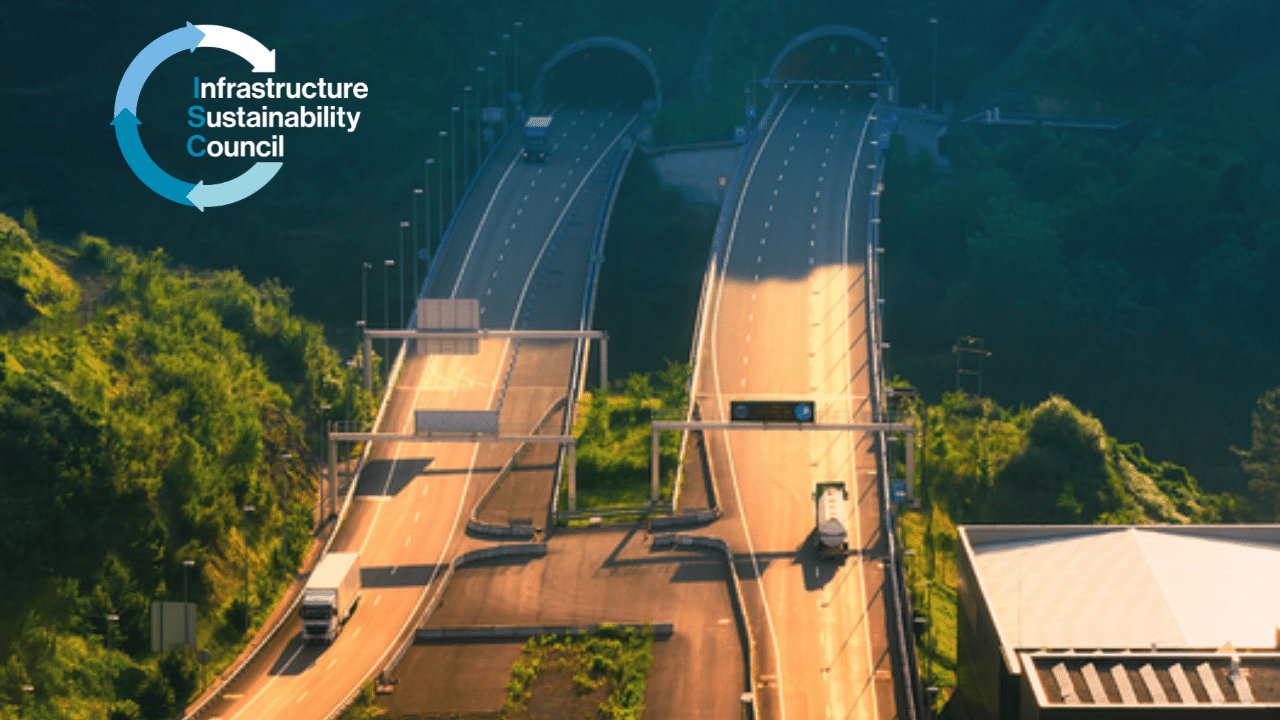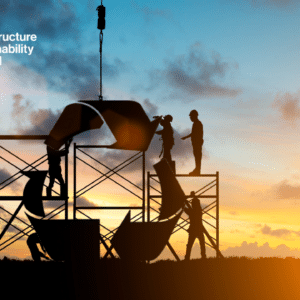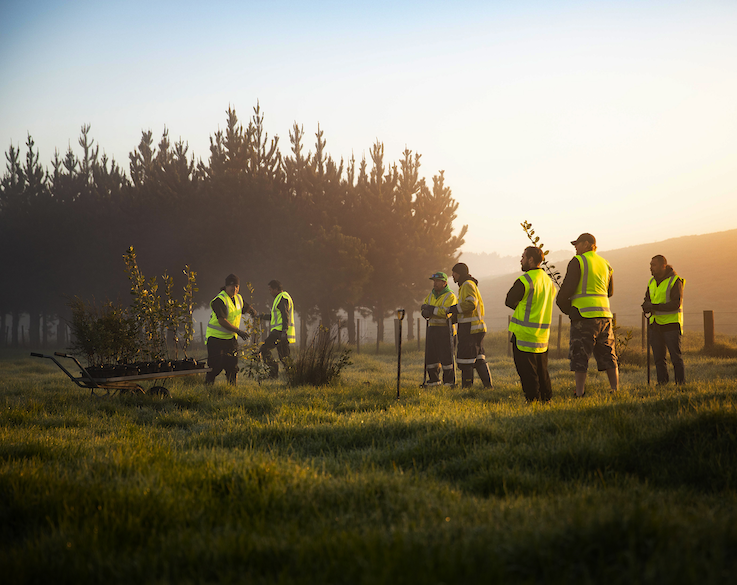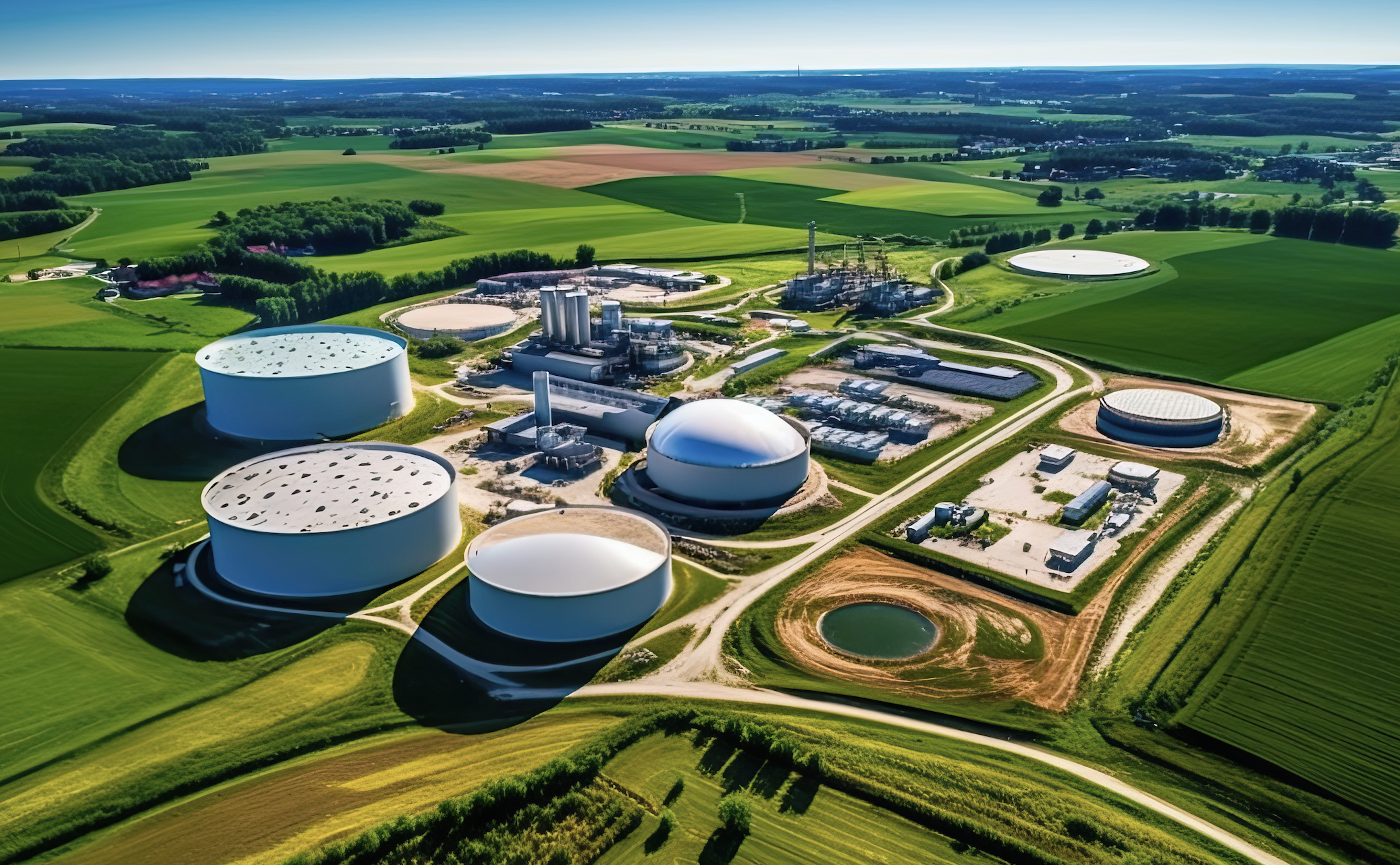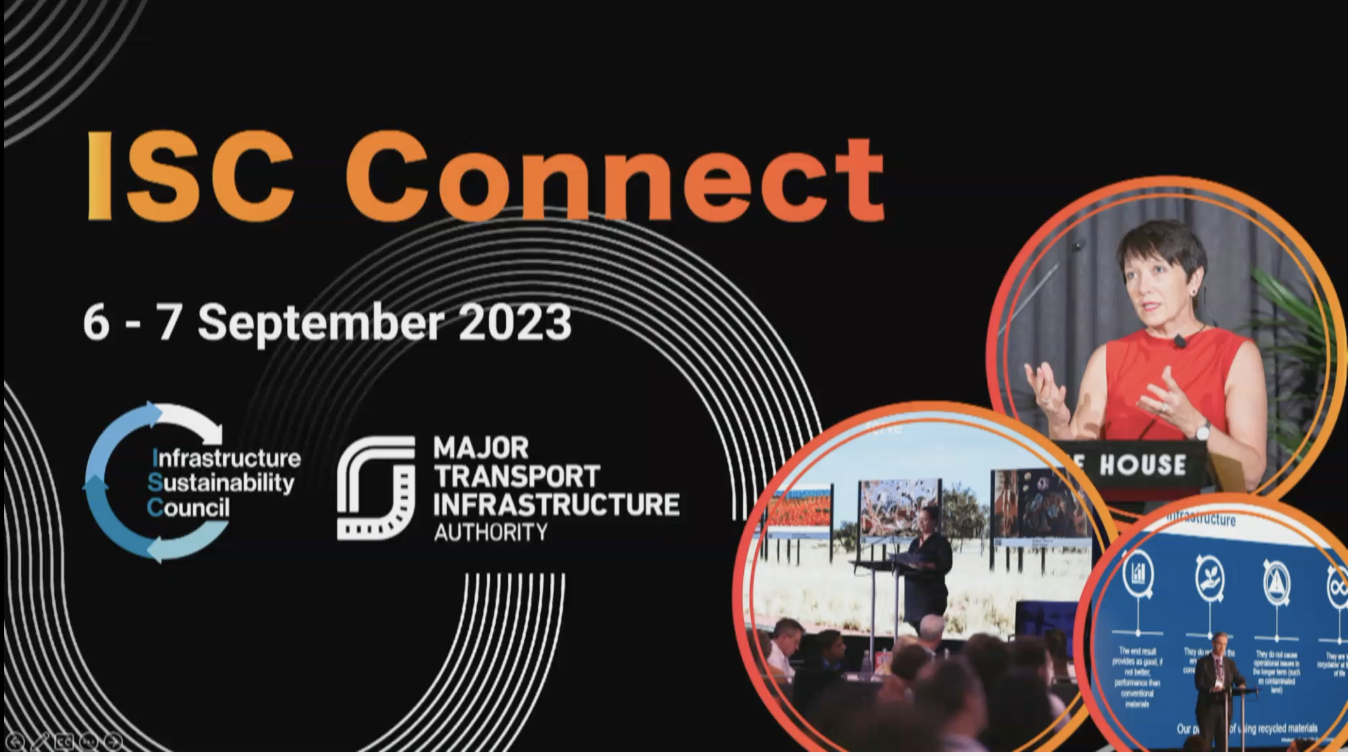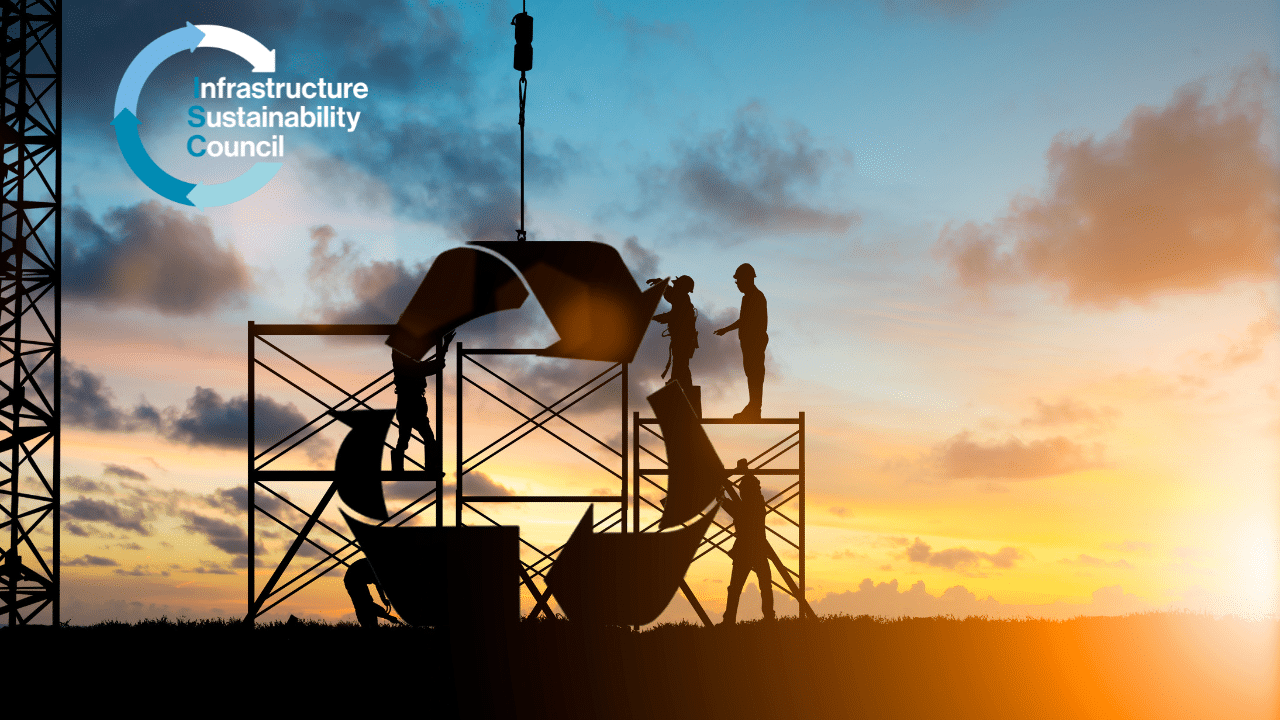Author: Sarina Aguinaldo
ISAP November 2023
BlueScope FY23 Sustainability Report
BlueScope – delivering sustainable outcomes
In its recently published FY23 Sustainability Report, global steel manufacturer, BlueScope, demonstrates how it is focusing its actions to deliver on its five sustainability outcomes. Key insights follow.
Climate action
BlueScope remains committed to actively addressing climate change and investing in greenhouse gas (GHG) emissions reduction to transform its business for long-term success.
Iron and steelmaking transformation will be dependent on the key enablers that underpin its 2050 net zero goal[1], including, technology evolution, access to raw materials and firmed, renewable energy, hydrogen availability and supportive policies.
In FY23 BlueScope achieved an 8.0% reduction in steelmaking GHG emissions intensity since FY18[2].
In a major leap forward, BlueScope has announced its intention to build a new electric arc furnace at New Zealand Steel’s Glenbrook site. With a target to be operational by 2026, this NZ$300 million project will be co-funded by the New Zealand Government and will reduce New Zealand Steel’s Scope 1 and 2 greenhouse gas emissions by at least 45 per cent.
In Australia, BlueScope has continued to progress exploration of lower-emissions iron and steelmaking technologies. This includes its collaboration agreement with Rio Tinto and completion of a concept study into Direct Reduced Iron (DRI) melter technology. BlueScope has also expanded technology collaborations with global steelmakers, such as thyssenkrupp, Tata Steel and POSCO.
As the business broadens its review of the most likely decarbonisation options for ironmaking in Australia, the reline and upgrade of the No.6 Blast Furnace at the Port Kembla Steelworks, NSW will provide the bridge to a low carbon future.
Responsible products and supply chains
Following the certification of the Port Kembla Steelworks to the ResponsibleSteel™ Standard in 2022, BlueScope’s Western Port site in Australia achieved ResponsibleSteel™ site certification in September 2023. ResponsibleSteel™ is the steel industry’s first global independent multi-stakeholder standard and certification program.
BlueScope publishes Environmental Product Declarations with the EPD Australasia Programme. Select products are also certified to the following programs: GreenTagCertTM GreenRate™, Eco Choice Aotearoa, Declare and Sensitive Choice®.[3]
BlueScope is creating strength for Australia’s renewable energy future, providing locally-made steel for major wind farm projects. A typical individual wind tower can include up to 300 tonnes of steel plate, averaging approximately 60 tonnes of steel for every megawatt (MW) of wind electricity generation.[4]
BlueScope continues to work with its customers to understand and meet growing demand for products and solutions that support their sustainability objectives and to collaborate with industry through key organisations such as the Infrastructure Sustainability Council.
Strong communities
In Australia, BlueScope continues to progress a range of initiatives as part of its First Nations Framework. Priority areas of focus include finalising employment and procurement strategies, with work underway to collaborate and engage with First Nations businesses in the Illawarra, NSW.
In New Zealand, BlueScope works closely with the Ngāti te Ata iwi to identify historical places of significance on and adjacent to the steelworks site. With members from Ngāti te Ata, BlueScope is working together to reduce soil erosion risks.
To view the full report, click here
[1] BlueScope’s net zero goal covers BlueScope’s scope 1 and 2 GHG emissions.
[2] FY18 is the baseline year for BlueScope’s steelmaking target of a 12% reduction in GHG emissions intensity by 2030.
[3] For more information see Sustainability Data Supplement FY23 bluescope.com/reports
[4] BlueScope analysis conducted in 2020/21 based on underlying energy needs to meet 2030 state renewables targets. See BlueScope’s Climate Action Report at bluescope.com.
Sustainability as a Key to Systemic Change in the Infrastructure Sector
The construction sector is facing several systemic issues that is undermining its ability to deliver the pipeline of future projects. For example, a recent study by the Australian Constructors Association estimated that the associated productivity loss impact this has is equivalent to $56 billion additional construction that we could be delivering per year, equivalent to 10 000 km new roads or 1 000 schools. Similarly, the New Zealand Treasury estimated that there is roughly a $200 billion infrastructure delivery gap. These are obviously complex and systemic problems, yet sustainability can serve as an ideal catalyst to help turn this around. This article delves into the opportunity that sustainability offers in driving systemic change and improving overall performance within the sector.
Most of my experience has been to drive large-scale change on a sector level. It includes leading the function within the United Nations member organisations to maximise the value that can be delivered through their national pipelines of infrastructure work. It is from this experience that it became clear that sustainability is an ideal catalyst or driver for large-scale change. It is not only critical and important, but it is a topic close to people’s hearts and has a significant flow-over on performance across all organisations.
The State of Affairs: Where We Stand
In line with the above ACA research, there has been a significant push to towards a more collaborative contracting and delivery approach across the infrastructure value chain. Yet, many key organisations and procurement functions are still operating on an arm’s length or silo basis. With pressing challenges such as stagnant productivity, a concerning rate of employee mental health issues, excessive firefighting, and difficulty in retaining top talent, the current model begs the question: Is it still fit for purpose? Furthermore, where infrastructure was once viewed as a catalyst for economic growth, ballooning costs and political embarrassments have fostered a growing cynicism, affecting growth and the ability to offer meaningful jobs. We urgently need to get out of this.
Embracing a Collaborative Outlook
One trend that has been the primary driver of productivity and performance improvement, is the shift towards collaboration/integration underpinned by more modern people-orientated practices, government policies, systems, and training. This is a fairly constant theme on an international level. Organisations and supply chains that once functioned within their silos are breaking through this, resulting in unparalleled levels of synergy and productivity improvement, sometimes by a staggering 30%. This is certainly not an overnight change, and it often took decades in other sectors. But this goes beyond mere productivity – it’s about the pace of change, the ability to adapt and thrive in increasingly complex environments.
The punchline is that the sector needs a massive overhaul to meet the demands of an ever-evolving world, and we need something that pulls us together to do this. Driving this from a typical productivity, efficiency or value for money standpoint has very little inspirational effect on the people that really matter on the coalface. We need change that is also driven bottom up.
The Sustainability Catalyst
Amidst this backdrop, sustainability emerges not as a background clutter but a resounding call to action. With the infrastructure sector having a hand in around 80% of greenhouse gas emissions and a profound influence on community well-being, the pressure to act responsibly is paramount.
And while many see sustainability from a mere compliance lens and as a business cost, there’s a profound link between sustainability and organisational performance waiting to be explored. The top of the iceberg is that it creates an environment where people are important, and it therefore offers a more meaningful and participatory work environment. Dive deeper, and one finds that there is a significant overlap on a practice level, as also contained in the ISC framework, between sustainability and the trend towards a more productive organisation. To mention only a few, it includes early-stage planning and design input (Early Contractor Engagement), resource consumption minimisation (Lean construction), better governance, end-to-end collaborative process reviews, stakeholder engagement, better governance and positively impact employee wellbeing. The spill-over effect of these changes, as what has often happened in the water sector, has a profound impact on organisational performance. Yet, from a change management perspective, we are now driving change through a topic that is close to people’s hearts where you gain natural participation and where people are willing to take a personal stand to do things better. Hence the statement that sustainability is an ideal catalyst for systemic change.
Drawing from experience within asset owners, major contractors, sub-contractors, councils, and others, virtually all the sustainability-driven initiatives have not only led to marked sustainability results, but also provided a commercial benefits case that effectively funds a much deeper investment into sustainability initiatives. This demonstrates the potential of sustainability as an investment, one that reaps multifaceted returns. For example, a recent council benefits case, using sustainability as key driver, resulted in a $200 million or 12% additional infrastructure benefits case, based on resource efficiencies, improved collaboration, and employee wellbeing. This has a profound impact on the long-term quality of life of the local community. We therefore need to broaden our understanding of the sustainability value proposition as an integral part of operational performance.
The Road Ahead: Courageous Leadership
In essence, the infrastructure sector is presented with dual challenges – ramping up organisational performance and fulfilling the growing sustainability mandates. Yet, a key lesson is that these challenges intertwine, with sustainability emerging as a bridge that paves the way for a collaborative, efficient and forward-thinking infrastructure sector. Done correctly, these are complementary forces that accelerate positive change.What’s required now is courageous leadership – leaders who see beyond compliance, and view sustainability as the very fabric of an organisation’s strategy, culture, and operations. Such an approach promises value not just for businesses, but for the environment, communities, and the future we’re building. The call to action is clear: embed sustainability in the fabric of your organisation to deliver better results.
About the writer: Herman Potgieter has been intimately involved in infrastructure development, from a programme manager perspective up to leading national infrastructure pipeline initiatives. Much of this is also to look at the performance of the total supply chain to operate on a much more integrated and collaborative basis. He has also served on the ISC’s Water Advisory Group.
ISC Connect 2023 – Session 11
Watch the ISC Connect 2023 session 11 recorded on 7 September 2023.
This recording discusses the following:
SESSION 11: EMBEDDING SUSTAINABILITY FROM THE OUTSET
Embedding sustainability in infrastructure from the outset ensures long term returns and enhances resilience for the people it serves. Hear more about the benefits of identifying risks and opportunities early and then managing these iteratively to optimise total life cycle costs, reduce emissions and deliver on community expectations.
ISC Connect 2023 – Session 9A & 10A
Watch the ISC Connect 2023 session 9A & 10A recorded on 7 September 2023.
This recording discusses the following:
SESSION 9A: FINANCE AND GOVERNANCE FOR SUSTAINABLE INFRASTRUCTURE
The number and size of facilities, instruments and funds available for sustainable business opportunities and climate resilient assets is rapidly increasing, and with it reporting and metric complexity.
This panel will examine the array of existing and emerging ESG criteria (e.g. PRI, PRB, Net Zero Banking Alliance, Net Zero Investment Consultants Initiative) that help lenders and investors align with global sustainability goals such as net zero, resilience and inclusivity, and will touch on the increasing investment attraction of infrastructure.
SESSION 10A: VALUING NATURAL CAPITAL
With a third of Australia’s GDP relies on biodiversity and ecosystem services, improving nature-related outcomes can unlock market opportunities. The Taskforce on Nature-related Financial Disclosures (TNFD) framework, requiring dependencies and impacts on nature to be reported, is set to launch in September. This panel explores how those in the infrastructure sector are factoring nature into financial and business decisions, with examples spanning resilience, regenerative design, and carbon sequestration on land for a thriving nature-positive economy.
ISC Connect 2023 – Session 7A & 8A
Watch the ISC Connect 2023 session 7A & 8A recorded on 7 September 2023.
This recording discusses the following:
SESSION 7A: OUR INCLUSIVE NATION
Four of the UNSDGs promote equality, and reducing disadvantage within and between nations. Meeting these goals calls on the values of respect and fairness and requires cultural, social, attitudinal and behavioural change. Codesigning policies, programs and practices for inclusivity in infrastructure will enable our nations to thrive. For Australia, our rich differences can be a national advantage and it starts with connection then partnership.
SESSION 8A: CIRCULAR ECONOMY
Infrastructure is starting to progress circular economy beyond recycled content. This panel will reference examples of a more systemic shift to optmising the economic value of products and services already in the market beyond traditional practice. Business, social and community outcomes are on the rise so – how do we increase demand and stimulate sustainable supply?
ISC Connect 2023 – Session 5A & 6A
Watch the ISC Connect 2023 session 5A & 6A recorded on 6 September 2023.
This recording discusses the following:
SESSION 5A: INSIDE LOOKING OUT
Exploring new ideas and ways of tackling challenges is crucial for any business committed to sustainability. Whether its enhancing culture or partnerships, increasing productivity or making process improvements for greater efficiency – all require positive change. Innovation and creativity will be catalysed by looking outside the infrastructure sector for major opportunities or more incremental changes we can adopt and adapt.
SESSION 6: IMPACT AND INNOVATION
An opportunity to be actively immersed in the latest innovations for impact. Practical examples are showcased in elevator-expose’s with the option to learn more about the new advances in products, process and practices from each innovator.
ISC Connect 2023 – Session 3A & 4A
Watch the ISC Connect 2023 session 3A & 4A recorded on 6 September 2023.
This recording discusses the following:
SESSION 3A: TOWARD NET ZERO
With infrastructure enabling 70% of emissions, Australia needs a nationally coordinated, sector-wide approach to reducing emissions. The implementation of emissions budgets and targets can help accelerate our trajectory. As countries all have different specific local challenges, we can decrease our learning curve. These include progressive approaches to developing capability, new skills and professional development pathways as well as using procurement as a powerful catalyst for the energy transition. Policy development must accelerate along with increased transparency as a key opportunity to raise the overall pace of delivery.
SESSION 4A: BUILDING SUSTAINABILITY AND CAPABILITY IN INFRASTRUCTURE
The ISC is committed to developing a thriving industry and building a stronger infrastructure workforce by developing skills and capabilities and providing tools and resources. CONNECTing with the dynamic infrastructure sustainability community in a friendly environment is a sure-fire way to attract, inspire and engage enthusiastic new talent. CONNECT is a great place to ask questions and learn to more about sustainability as a rewarding career path in infrastructure.
ISC Connect 2023 – Session 1 & 2
Watch the ISC Connect 2023 session 1 & 2 recorded on 6 September 2023.
This recording discusses the following:
SESSION 1: WHAT WILL DEFINE THIS DECADE
There are 6 years to 2023; 76 months and 25 seasons. To set the scene and what kind of action will define this decade for infrastructure, Minister King will provide the national perspective of our priorities and Duncan Elliott, CEO of Major Road Projects Victoria will share the focus at the state level here in Victoria. While government is responsible for setting the direction, collectively as organisations and individuals we set the sails – its is a choice how we rise to the challenge; and respond to continued uncertainty.
SESSION 2: SYSTEMIC RESILIENCE
Infrastructure, our integrated system of systems enables nations to thrive. This session considers global infrastructure megatrends trends, as well as public and private investment; Australia’s ambitions and policy direction for infrastructure and how positioning as a renewable powerhouse presents opportunities domestically and across the Indo-Pacific.
ISAP October 2023
Waterfield’s RapidConsensus Workshop
Join the latest RapidConsensus workshop held on November 23rd and 24th.
The sustainable success of an organisation relies on how well its teams perform day to day. If the people within an organisation are not working together effectively, with unclear actions and running on multiple agendas there is no capacity for growth.
This can be frustrating company-wide where hard work is not resulting in momentum and there is a lack of alignment. When teams are disengaged from a productive end result, there is a lot of wasted effort to re-focus and continually bring everyone together to reach that shared destination.
RapidConsensus helps create actionable agreement and alignment that underpins a motivated and productive team.
- Gain collaborative alignment for clear outcomes and action
- You will learn the skills and confidence to effectively engage and facilitate groups for the best way forward
This dynamic workshop is delivered in 2 parts, encouraging you to practice real world opportunities across in-person and virtual group dynamics.
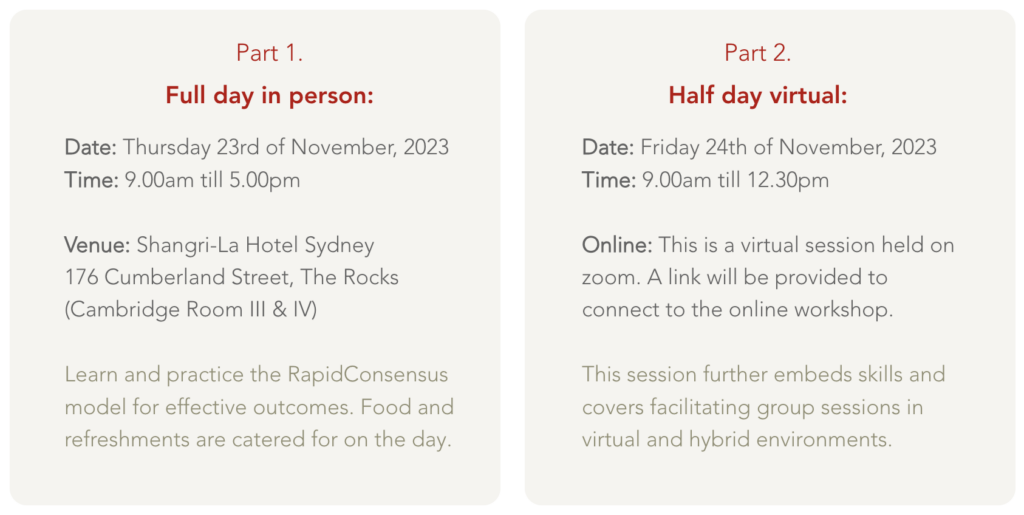
Waterfield is offering a special discounted participant fee of $1,000 when you mention Ainsley Simpson on your booking.
To book your place, CLICK HERE.

